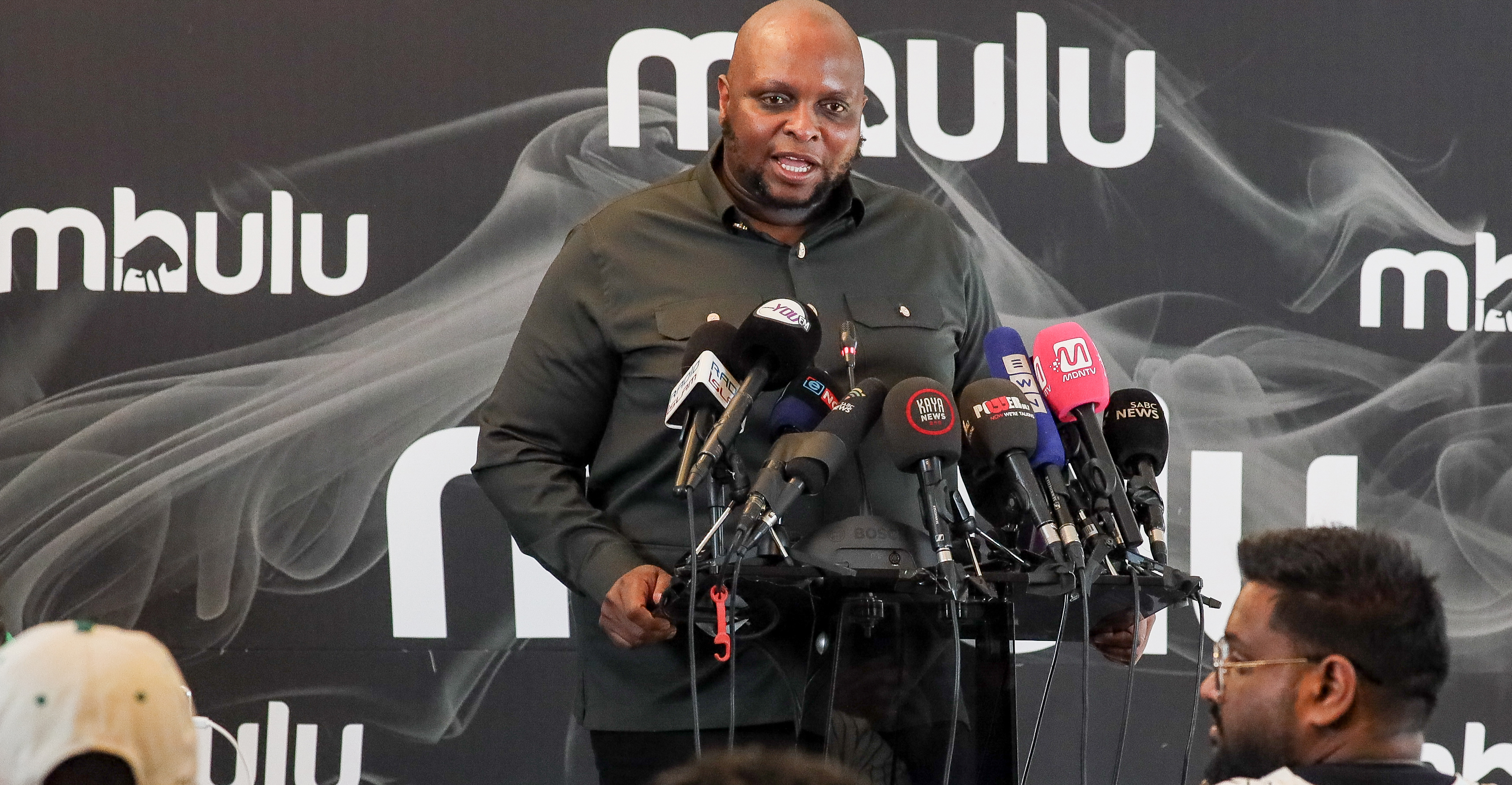Floyd Shivambu is charting a path similar to the one Jacob Zuma once took, as he looks to establish a new political party, despite still holding membership in the uMkhonto Wesizwe (MK) party. This marks his first solo move in a competitive political landscape.
Shivambu’s political career began in the ANC Youth League, where he was the spokesperson during Julius Malema’s time as president. In this era, the two were known for their radical rhetoric and support for the nationalisation of key industries.
[embed]https://youtu.be/L10ow5DSQzE[/embed]
Shivambu was expelled from the ANC under former president Jacob Zuma’s leadership, in 2013 a year after Malema was expelled from the party.
They co-founded the Economic Freedom Fighters (EFF). As a founding member, Shivambu played a major role in shaping the party’s direction and ideology, which is rooted in Pan-Africanist principles.
Shivambu held the position of deputy president for more than 10 years, staying with the party through its best and worst times.
The EFF had a strong start in the 2014 general elections, winning 6.35% of the vote. In 2019, it grew its support to 10.79%. But by 2024, support dropped to 9.52%, which can be attributed to a number of reasons, including growing tensions inside the party as well as the rise of rivals, such as the MK party.
Read more: Floyd Shivambu looks to form new party — just 10 months after joining MK
[embed]https://youtu.be/bYLUIivXNP0[/embed]
Shivambu was Malema’s second in command, seen as a key strategist to support his commander-in-chief’s mercurial charisma. (Both are linked to unlawful funds the party received from VBS Mutual Bank.) Eventually, they had a falling out, apparently over Malema’s belief that Shivambu was a potential rival.
/file/dailymaverick/wp-content/uploads/2023/07/od-queenin-eff-sunday-MAIN.jpg)
On Thursday, 19 June, Shivambu said leaving the EFF was the most politically sound decision he had taken, adding that while he was with the red berets, the collective leadership held a meeting in which they unanimously agreed that Malema was not fit to lead the party.
“We were legitimising rubbish, and there was no way that one could dedicate their intellectual muscles and work when in practice this thing we said we were standing for is not principle…”
“We reached the same conclusion that we are not being fair if we say that this comrade [Malema] can lead this country,” Shivambu said.
Read more: Farewell to Floyd: EFF’s brooding iconoclast defects to MK
10 months with MK
In August 2024, Shivambu defected to the MK party, and within weeks he was parachuted into the roles of national organiser and eventually secretary-general. Discontent quickly surfaced in the party’s leadership ranks.
Among those who opposed his appointment were senior party members who pointed out that just three months earlier, during the May 2024 general elections, he had actively campaigned against the very party he now represented.
His biggest detractors included Zuma’s daughter, Duduzile, who on one occasion publicly insulted him, with comments that he was “the worst thing that happened to MK”, “useless”, and calling him “Mafikizolo”, which loosely translates to “newcomer”.
[embed]https://youtu.be/gHVSO-6U0Jc[/embed]
Read more: How Floyd Shivambu caused his own MK party downfall
On Thursday, 19 June, in what appeared to be comments directed at Duduzile, Shivambu said: “Even against all odds, if there is an opportunity to raise an issue about wrongdoing, I will speak and clearly speak against the untouchables, people who take drugs and tweet at night and insult us.”
During his tenure at the MK party, he played an important role, contributing to establishing the party’s constitution, establishing branches and putting systems in place. However, at some point, he was accused of attempting to centralise financial control of the party, with claims that he sought sole authority over its funds.
On Thursday, he revealed that part of the reason he was removed as secretary-general (SG) was the belief that he was plotting to dethrone Zuma. He claimed the former president is surrounded by “political scoundrels” who are siphoning off millions from the party.
He boasted he “left” the ANC when it was above 63% in Parliament, when it had power, suggesting that he was hardly bothered by the MK party possibly expelling him when it wasn’t in power.
Zuma, when he faced a disciplinary hearing in the ANC, had the same posture.
“This thing of political parties thinking that people are desperate for membership must come to an end,” Shivambu said.
Against old allies
Shivambu announced on Thursday that he would be embarking on a consultative process to establish whether there is an appetite for a new party. This comes two weeks after he was removed as SG over his controversial Easter Weekend visit to fugitive pastor Shepherd Bushiri’s church in Malawi.
His announcement of a consultative process brought more questions than answers, including how the process and the party itself will be funded.
“Funding for what when we do not have an organisation? We are going to listen, we are in a listening session, and if MK thinks that listening is a cause for termination of membership, so be it,” Shivambu said.
The process mirrors what happened when Shivambu and Malema started the EFF. They initially embarked on a series of consultative meetings before launching the party.
Shivambu’s political career shows a clear pattern. He aligns himself with bold, revolutionary movements, but often parts ways when leadership strays from his ideals or when internal power struggles emerge.
Read more: Former MK party secretaries did many ‘wrong things’, says Zuma after Shivambu’s axing
It remains unclear what the core tenets of this new political formation are, but it may become a little clearer next week when he announces what he said would be an interim structure to lead the consultative process. For now, he has indicated that the structure will consist of representatives from provinces across the country.
Based on his history, Shivambu is likely to form a party that supports radical economic change, including land expropriation without compensation, state-led industrialisation, and the nationalisation of key industries. These are ideas he has pushed since his time in the ANC Youth League and the EFF.
His ideology may still lean towards Pan-Africanism, but with a more practical approach. With his background in the Youth League and student activism, he’s also likely to focus on young people, especially on issues such as education, jobs and housing, aiming to win back younger voters who feel ignored or disappointed with current political options.
His possible party will enter a competitive landscape, where smaller parties have proliferated as the ANC’s dominance continues to decline and more breakaway parties, and splinters of the breakaway parties, contest each election.
He boasted on Thursday that he’s done political work in every corner of the country, but he has no clear constituency and cannot rely on a Malema or Zuma to draw support. Those whom he chooses to partner with will be key in drawing support.
Shivambu’s new party has the potential to draw support from EFF members who are dissatisfied with the party’s direction under Malema or disillusioned by internal divisions. Some of these individuals see Shivambu as the intellectual force or strategic brain behind the EFF’s early success.
He stands little chance of drawing voters away from the MK party as it is strongly built around Zuma’s identity. However, he might attract younger supporters and those who are frustrated with the party’s lack of structure, and those with the growing perception that the MK party is a tribalistic movement and is being run as a family business. DM





 Former MK party secretary-general Floyd Shivambu briefs the media at the Mhulu Luxury Boutique Hotel in Midrand on 19 June 2025. Shivambu was removed from his position as secretary-general a few weeks ago. (Photo: Gallo Images / Fani Mahuntsi)
Former MK party secretary-general Floyd Shivambu briefs the media at the Mhulu Luxury Boutique Hotel in Midrand on 19 June 2025. Shivambu was removed from his position as secretary-general a few weeks ago. (Photo: Gallo Images / Fani Mahuntsi)